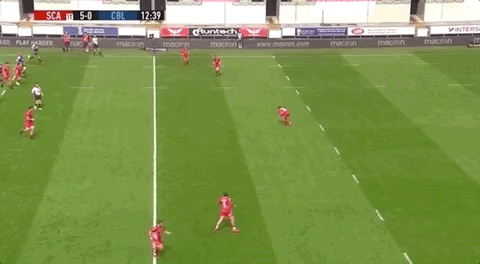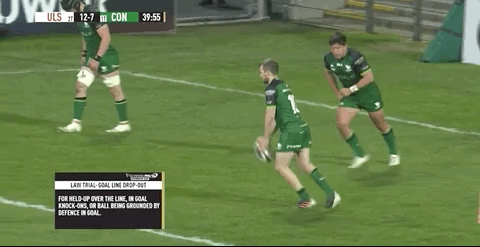WORLD RUGBY HAS confirmed that the 50:22 kick and a trio of new laws around the breakdown will be trialled globally in all competitions that start after 1 August.
The 50:22 law means that if a player kicks from inside their own half and the ball bounces before going into touch inside the opposition 22, the kicking team will get to throw into the subsequent lineout.
In the example below, the red team would get to throw into the lineout.
The hope is that this new law will force defences to keep more players in the backfield, therefore reducing their ability to bring high linespeed in the frontline and opening up space for the attacking team.
World Rugby hopes this will, in turn, reduce injuries caused by big collisions.
The 50:22 law has already been trialled in Australian rugby.
The game’s governing body also confirmed that the goal-line drop-out will be trialled globally from next month onwards. We have already seen this law trialled in the recent Rainbow Cup and in Super Rugby.
This law means that if the attacking team is held up over the tryline or knocks the ball on in the in-goal area, the defending team will take a drop-out from their own tryline. If the attacking team kicks into the in-goal area and the defending team grounds the ball there, the defending team also receives a drop-out from their own tryline.
World Rugby says this law aims to “reduce the number of scrums, reward good defence, encourage counter-attacking, and increase the rate of ball-in-play.”
Meanwhile, a trio of law trials relating to the breakdown could have a big influence on the shape and safety of the game.
One of them outlaws the practice of pods of three or more players being pre-bound prior to receiving the ball. The sanction for this offence will be a penalty kick to the defence.
Pre-latching in pods has been a common feature of professional rugby in recent years, creating situations where attacking players can overload defenders, particularly close to the tryline, and prevent any contest for possession.
World Rugby has also tightened the law around one-player latches, which are still to be permitted. The latching player now has the same responsibilities as a first arriving player at the breakdown – they must stay on their feet, enter through the gate, and not fall to ground. Again, the sanction for offending in this manner will be a penalty.
Finally, World Rugby has is introducing a trial law that will ask referees to sanction any breakdown clearouts that target the lower limbs of defenders.
We have seen some major injuries caused by these clearouts in recent times but World Rugby says anyone who “targets/drops their weight onto the lower limbs of a jackler” will be sanctioned with a penalty.
The new breakdown laws, which are focused on reducing injuries in the game, were developed after detailed evaluation by an expert ‘breakdown working group’ including All Blacks head coach Ian Foster, England boss Eddie Jones, All Blacks flanker Sam Cane, and Ireland’s Dan Leavy, who suffered a serious injury to his knee at the breakdown in 2019.
Former Ireland head coach Joe Schmidt – who is now World Rugby’s director of rugby and high performance – was also centrally involved in the process around the breakdown and kicking trials moving to a global level for all competitions that start after 1 August.
Following a one-year global trial, the laws that are rated as successful in hitting World Rugby’s goal of “increasing safety while enhancing the spectacle” will be reviewed in order to decide whether or not they are adopted into permanent law in May 2022.
The law trials have been announced as part of World Rugby’s new six-point plan to advance player welfare in rugby.



